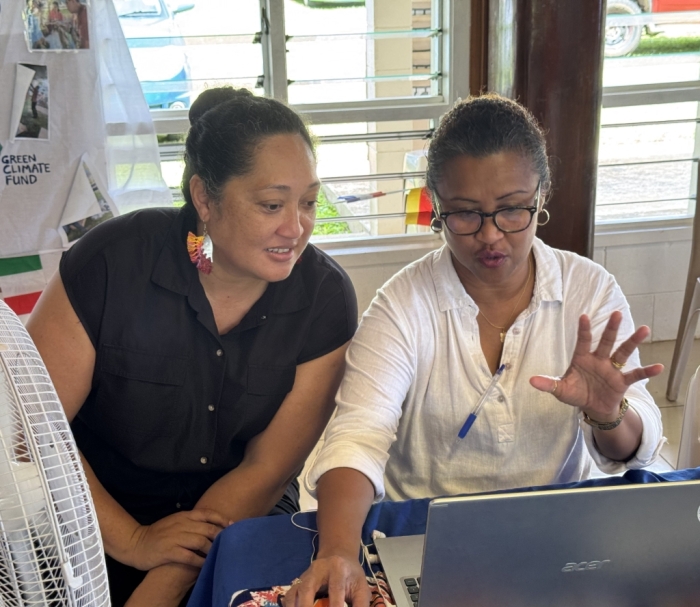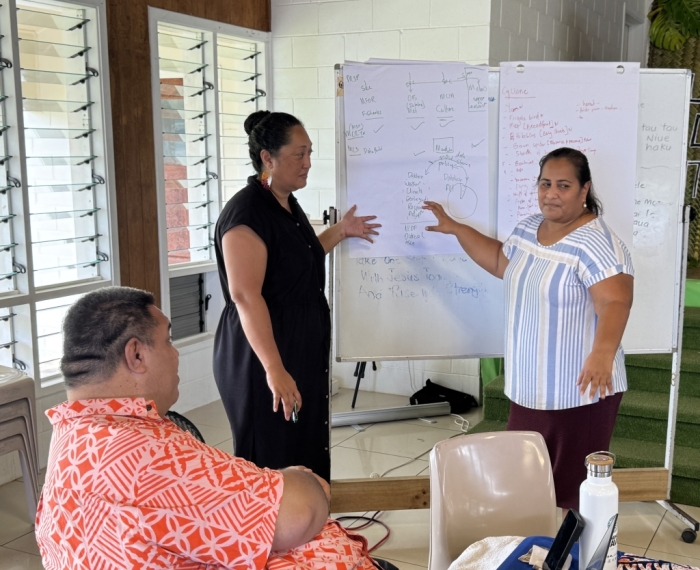
Thursday 27 March 2025, Alofi, Niue – After a week of collaboration and knowledge exchange, participants have emerged from a regional workshop held in Niue with concrete plans on how they will strengthen the integration of traditional knowledge and gender into their climate early warning systems in their respective countries.
On the final day of the Joint Regional Peer-to-Peer Learning on Integrating Traditional Knowledge and Gender into Climate Early Warning Systems, the country participants used the knowledge they had gained throughout the week through the sharing of experiences with neighbouring island countries, and from the expert team from the Secretariat of the Pacific Regional Environment Programme (SPREP), Pacific Community (SPC), and the United Nations Environment Programme (UNEP) to develop their country plans.
Over the course of the workshop, the countries were able to identify where they are in terms of their traditional knowledge project, which is a component of the Climate and Oceans Support Programme in the Pacific (COSPPac) Phase 3 project, and from there, chart a way forward to ensure that traditional knowledge empowers and informs for more resilient Pacific communities.
The participants outlined their plans to progress their traditional knowledge projects, from developing legislation and policies, to designing of surveys and survey questions, developing of a traditional knowledge database for storage and archiving of collected data and information, and a system for monitoring the collected data.

The week-long workshop included knowledge sharing between the participants from the eleven countries including the local Niuean communities. A field visit to the Hakupu village ufi patch on Saturday gave the participants the chance to see what the Girls Brigade and Boys Brigade of Hakupu village are doing as part of their contributions to the Traditional Knowledge project with the Niue Meteorological Service.
Community members and elders were invited to attend the discussion from Monday 24 to Thursday 25 March, where they were also able to share with the participants the wealth of traditional knowledge they already possess, and how it works together with the science to achieve resilience.
Former Cabinet Minister and Member of Parliament, Ms. Va’aiga Tukuitonga, was one of the elders from the Niuean community who attended all four days of discussions, which she said was very worthwhile.
“This has been a very interesting workshop and I believe more people should be here to learn about what traditional knowledge is from our own countries and to hear from other countries as well."
Mr. Sebastian Detanamo of Nauru shared his experience as part of this learning and knowledge exchange with his peers, stating that “the experience and expertise that has been shared this week on aligning traditional knowledge with our climate services has been invaluable and is something that I will be taking back with me to Nauru.”

“It’s also been great to hear about the importance of gender equality and social inclusion, ensuring that our warnings are received by everyone at the last mile,” he added.
Ms. Elisapeta Kerslake, Programme Director for the United Nations Environment Programme (UNEP) Enhancing Climate Information and Knowledge Services for Resilience in the 5 island countries of the Pacific (CIS-Pac 5) Programme, said that the workshop was eye-opening, and a great opportunity for learning for all involved.
“It’s been a very eye-opening week, learning from the experts on traditional knowledge from around the region and also our elders who were able to join us this week,” Ms. Kerslake said.
The COSPPac 3 project’s Traditional Knowledge Adviser, Ms. Siosinamele Lui, echoed that it has been a week of learning, appreciation and acknowledgement of the baseline work developed through COSPPac that has gone into the development of tools and traditional knowledge work by countries such as Vanuatu who are leading the way in the region, and the influence this will have on countries who are just starting out on their own journeys with traditional knowledge.
“The participants are leaving this workshop with newfound understanding and appreciation of the tools and methodologies that will help them chart a new course for the traditional knowledge work in their own countries,” Ms. Lui said.

The Joint Regional Peer-to-Peer Learning on Integrating Traditional Knowledge and Gender into Climate Early Warning Systems is being held in Alofi, Niue from 21 – 28 March 2025. It is jointly hosted by the Secretariat of the Pacific Regional Environment Programme through the Climate and Oceans Support Programme in the Pacific (COSPPac) Phase 3 Project and the United Nations Environment Programme’s Enhancing Climate Information and Knowledge Services for resilience in the 5 island countries of the Pacific Ocean (UNEP CIS-Pac 5) Programme.
The Climate and Oceans Support Programme in the Pacific Phase 3 (COSPPac 3) project is a four-year project funded by the Australian Government Department of Foreign Affairs and Trade (DFAT) and the Government of New Zealand’s Ministry of Foreign Affairs and Trade (MFAT), which aims to support Pacific National Meteorological and Hydrological Services to deliver useful and usable climate and ocean information services to enable all Pacific peoples to remain resilient to the impacts of climate change and disasters. It is jointly implemented by the Australian Bureau of Meteorology (BOM), the Pacific Community (SPC), and the Secretariat of the Pacific Regional Environment Programme.
The UNEP CIS-Pac 5 is a USD 49.9 million programme led by UNEP and funded by the Green Climate Fund to establish integrated climate and ocean information systems and a multi-hazard early warning systems in Cook Islands, Niue, Palau, Republic of the Marshall Islands, and Tuvalu.
For more information, please contact Ms. Siosinamele Lui at [email protected].